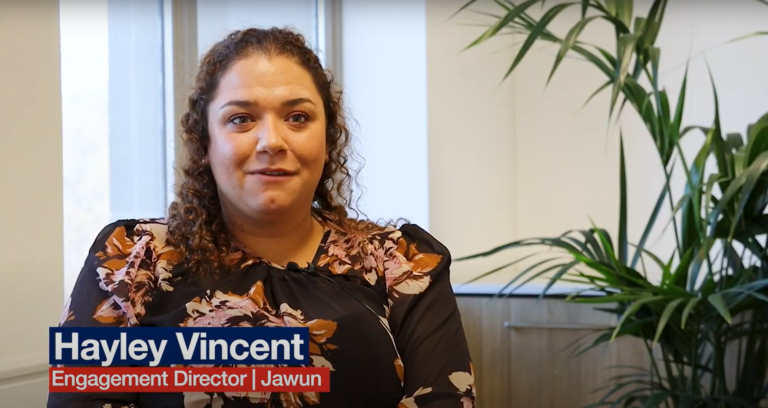Jawun APS Secondment Program
A strategic partnership with Jawun to support Indigenous leaders to achieve their own development goals and develop APS leadership capabilities.

The Jawun APS Secondment Program
The Jawun APS Secondment Program is a strategic partnership between the APS and Jawun.
The APSC, on behalf of all participating Commonwealth entities, has signed a memorandum of understanding (MOU) with Jawun to guide participation in the program.
Participation in the program supports the Commonwealth’s response to the National Agreement on Closing the Gap, principally by targeting Priority Reforms #2 and #3:
- to assist Indigenous-led organisations to achieve their own leadership, development and capability goals; and
- to develop Indigenous cultural competence as well as professional capability in government organisations across the APS.
About the program
‘Jawun’, in the Kuku Yalanji language of Cape York, means ‘to be a friend’.
The APS deployed its first secondees to the Jawun Program in 2011. Since then, over 1,000 employees from over 75 agencies have participated in the program, transferring skills and knowledge where invited by Indigenous communities and leaders.
In return, APS secondees increase their awareness of the cultural diversity of Indigenous Australia while developing new professional and personal skills, confidence and resilience. They bring their learnings back to their sponsoring agency and community to influence the broader system and achieve better outcomes for all citizens.
An ongoing goal of the program is to:
- increase placement opportunities and options
- engage Jawun alumni to become advocates of the program and mentors for outgoing secondee cohorts
- expand the pool of nominees
- open new opportunities for a broader range of Commonwealth employees and leaders.

Created in collaboration with Defence Housing Australia, Jawun, and the APSC, this video offers a first-hand look at the secondment experience, highlighting how the program expands cultural capability, supports Indigenous communities, and fosters tangible impacts within the Australian Public Service.
Standard Jawun secondments
The Jawun APS Secondment Program offers standard (6 week) secondments to substantive high-performing and high-potential APS 6 and above employees, who are flexible, resilient and prepared to be taken out of their comfort zone.
Empowered Communities secondments
In addition to the secondment of APS employees with technical skills and expertise across its network of Indigenous Regional Organisations (IROs), Jawun also works with the national Empowered Communities collective of Indigenous leaders on a range of broader, transformational policy reforms. These focus on empowering local communities to make strong, local decisions on identified local priorities.
To assist this work, Jawun asks the APS to support a number of longer, more strategic projects. Empowered Communities projects are 12 week initiatives, often requiring higher order strategic or operational expertise, so are usually limited to high-performing Executive Level 2 or Senior Executive Service (SES) leaders.
Returning Empowered Communities secondees frequently note the depth of connection able to be achieved with their organisations and communities across the 3 month duration, often continuing beyond the secondment itself.
Jawun hybrid secondment model
Jawun secondments can be either in-place or virtual. In-place secondees are placed with an Indigenous Regional Organisation for the duration of the secondment. Virtual secondees contribute to a specific project with an Indigenous organisation, working either part-time or full-time from their home or usual workplace and the secondment term is based on the number of hours the secondee can commit to over the 6-week period.

Regions
Jawun APS secondments are available in 12 regions:
|
|
|
|
|
|
|
|
|
|
|
|
Types of skills in demand
Placements depend on matching secondee skills with what is required by the Indigenous Regional Organisations. Some of the skills required are:
|
|
|
|
|
|
|
|
|
|
|
|
|
|
|
|
|
|
|
|
|
|
|
|
|
|
|
|
|
|
2025 Secondment Rounds
Dates for each round, commencement dates, end dates and final nomination cut-off dates are listed below.
| Secondment Round | Secondment dates | Nomination cut-off date |
|---|---|---|
| Round 1 | between February and April | Thursday, 14 November 2024 |
| Round 2 | between April and June | Thursday, 23 January 2025 |
| Round 3 | between July and September | Thursday, 24 April 2025 |
| Round 4 | between October and December | Thursday, 10 July 2025 |
Before applying
Before applying, consider whether an immersive experience of this type and duration is the right development opportunity for you.
The program needs people who are able to adapt quickly and be flexible about changes to priorities and work tasks. You must be prepared to listen to the needs of the Indigenous organisation and recognise that you are there to support Indigenous leaders achieve their outcomes.
You must have good self-awareness. You will be away from normal support networks, sharing accommodation with total strangers and are likely to find yourself out of your comfort zone. It’s essential to know your stress triggers, and to ask for help when you need it.
Eligibility, applications and nominations
Who is eligible to apply for a Jawun secondment?
Standard 6-week Jawun secondments are open to high-performing, highly skilled employees at APS 6 and above, who are flexible, resilient and prepared to be taken out of their comfort zone.
Longer term secondments for 12 weeks are offered to high-performing Executive Level 2 employees and SES leaders.
How do I apply for the program?
To apply for the Jawun secondment, please contact your agency’s Jawun contact officer and ask if you can apply. If your application is successful, your agency will then nominate you for the Jawun selection process via the APSC.
Jawun then works with the APSC and Indigenous partner organisations to place secondees. This involves aligning their individual skills and experience with each regional organisation’s priorities.
Your agency’s Jawun contact officer can let you know about your agency’s application process and the number of nominees your agency is supporting for the year.
What are my agency’s responsibilities?
While the APSC is coordinating this program and is the key conduit for information and advice between agencies and Jawun, your home agency has several responsibilities. Your agency is responsible for its own internal selection process. It is expected that each agency selects potential secondees who are best suited to this type of immersive experience. Your agency is also responsible for:
- allocating a dedicated Jawun agency contact
- completing the internal nomination and selection process
- participating in the Jawun interview process
- arranging travel for secondees, including a travel allowance covering meals, in line with your enterprise agreement
- arranging a laptop, internet dongle and phone access for the duration of the secondment
- managing secondee Work Health and Safety (WHS) and risk matters
- supporting secondees before, during and after secondment
- reimbursing costs to Jawun, which may include: vehicle hire; fuel costs; 4WD awareness training; accommodation; some meals and other costs during induction; cultural awareness ceremonies; and incidentals.
Is the application and nomination process the same for virtual secondments?
Yes, the process is the same.
What skills are Jawun’s partner organisations looking for?
Consider your entire skillset, not only the skills you use in your current role. Tell us about what you can do and what you have learned in past roles, whether in the public sector, private sector or in voluntary and community work. The nomination form contains more information relating to skillsets.
If I am nominated, what happens next?
Jawun uses virtual interviews to confirm placements. If you are selected for an interview, the APSC will coordinate a meeting between you, the Jawun Regional Director and agency representatives. The interview allows the Regional Director to assess your attributes and attitudes, learn more about your skills and ensure a good fit between you and the host organisation. The interview also provides an opportunity for you to learn more about Jawun. It is important for potential secondees to be open and honest in their responses.
What happens if I am selected for a placement?
After your interview, the APSC will notify you if you have been successfully placed on a secondment. After this, Jawun will send you a Welcome Email which contains important information about your secondment, pre-reading and on-boarding forms to complete. There is an expectation that all pre-reading will be completed prior to the secondment. The Jawun National Induction is also included in this email and you are required to view this recording before you commence your Jawun secondment. The Regional Director will work with the Indigenous Regional Organisations to match you with a project scope.
How do I know which round to apply for?
Prior to selecting a preferred round on your nomination form, take into consideration your work and personal commitments. You need to commit to Jawun for the entire duration of the secondment, so make sure you have agreement from your workplace and your family to be away for the duration of your nominated round/s. Do not nominate for a secondment round if you have any work or personal commitments at that time, such as graduations, weddings, medical appointments or work project commitments.
I have completed a virtual secondment. Can I apply for an in-place secondment?
Yes, you can apply with your agency for an in-place secondment.
I have completed an in-place secondment. Can I apply for a virtual secondment?
Alumni of Jawun are encouraged to apply with their agency for a virtual secondment.
What are Jawun secondments like?
What happens on a virtual secondment?
Virtual secondees contribute to a specific project with an Indigenous organisation, working either part-time or full-time from their home or usual workplace. The minimum commitment is 100 hours over 6 weeks.
The format of the minimum 100 hours is flexible and will need to be discussed and agreed upon by the secondee and the host organisation, in conjunction with the Regional Director. It is expected that the virtual secondment will provide flexibility in how and when secondees work to complete the project scope with their host organisation.
There is flexibility in terms of how the project scope is completed. As with any project, a plan should be developed to outline how and when the project will be completed, and this needs to be agreed by all – the secondee, their agency, the host organisation and the Regional Director.
After a virtual secondment, can I visit the organisation I worked with?
Virtual secondees can plan a visit to the secondment organisation with their agency’s approval.
What is the role of the Jawun Regional Director?
Each Jawun region has a dedicated Regional Director who coordinates secondments with Jawun’s partner organisations. They match secondees to partner organisations, have the final say in the selection process, and work with partner organisations to develop project scopes for each secondment round.
Regional Directors play a pivotal role in linking secondees with their host organisations and their fellow secondees (for both in-place and virtual secondments).
The Regional Director is also the central contact point for secondees during secondment. They coordinate the induction, support secondees as they transition to the project work, and keep in regular contact. The Regional Director coordinates a debriefing session at the end of the secondment.
What happens on an in-place secondment?
You will spend up to a week in your induction, which involves learning about local Indigenous culture and meeting staff from Indigenous organisations and community members. Induction week may include a camping trip (region and weather dependent), and in remote regions an off-road 4WD awareness course (region dependent). Induction builds team cohesion with your fellow secondees (corporate and other APS employees) who will form part of your support network for the remainder of the secondment.
After induction, you will begin working on your allocated project with your Indigenous organisation. You will need to remain flexible about your project, as priorities often change, which means your project may change with little notice. There will be check-ins by the Jawun Regional Director and weekly updates to complete on your project. At the end of the secondment you will complete a final report and present on your progress to regional stakeholders.
What support can I expect while on an in-place secondment?
The Regional Director will be your main point of contact and will regularly check on your progress and provide support. It is expected that your agency’s Jawun contact officer and/or your manager will provide pastoral care on a weekly basis. Your agency’s Employee Assistance Program provider is also available if required.
The APSC is the first point of contact for any issues arising during secondment. The APSC will coordinate with your agency and Jawun to resolve issues. In extreme circumstances, secondments may be terminated.
Who else will I meet on an in-place secondment?
You will be placed in a group of Jawun secondees who could come from a range of corporate, not-for-profit and public sector organisations.
The strong bonds that develop over the course of an in-place secondment are a hallmark of the Jawun model.
Rules and policies
What specific laws, rules or policies do I need to be aware of?
All secondees must abide by the local laws of their secondment region, including respecting dry communities, where relevant. As a general rule, you should exercise common sense and respect people’s dignity at all times. Your Regional Director will discuss protocols that apply to the region during induction. Information for each region is included in the WHS Manual provided as mandatory pre-reading via your welcome email.
You will need to abide by any restrictions placed on you by your agency as part of its WHS and risk management approach. Secondees are expected to act professionally at all times. Your behaviour reflects on you, your agency, your host organisation, Jawun and your fellow secondees. All APS secondees must abide by the APS Code of Conduct whilst on secondment.
What is expected of me after secondment?
Following your secondment, you are expected to debrief with your agency contact for Jawun and your manager. You are encouraged to share your experiences and champion the program with colleagues throughout your agency, including through meetings, information sessions, the intranet and blogs. You can elect to maintain contact with your host organisation or take on volunteer work within communities.
Do I need a COVID-19 vaccination to go on an in-place secondment?
All participants must be fully vaccinated against COVID-19 to participate in a secondment or any other in-place Jawun activity.
Can family members visit me on an in-place secondment?
Family visits during secondment are not encouraged. Jawun is an immersive experience, and you will be encouraged to join in-place activities outside your normal working hours. In most instances, you will be living in shared accommodation, which is not conducive to family visits. Weekend reunion travel is generally not available, although you may be able to negotiate weekend travel options with your agency. You will need to take into account any directions from your Regional Director regarding specific weekend-reunion guidelines for each region.
Are there rules around weekend activities?
Given Jawun is an immersive experience you are encouraged to participate in community activities outside work hours. You can also arrange your own activities after work hours or on weekends. Activities undertaken outside of Jawun organised activities are at your own risk, and you will need to sign a release and indemnity agreement to that effect prior to the secondment. Jawun has specific rules around weekend activities and use of hire vehicles. Your Regional Director will provide advice. Your agency’s risk management plan for Jawun will also provide guidance.
More information
For more information about Jawun please visit the Jawun website or contact us.



